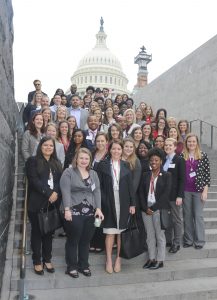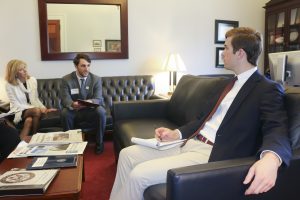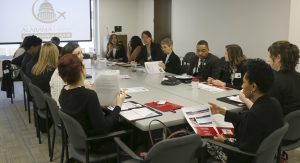
Social work students at The University of Alabama learned firsthand how dizzying, difficult and demanding policy advocacy is on Capitol Hill during the first University of Alabama School of Social Work Policy and Advocacy Washington D.C. Fly-In.
The unique crash course in policy research, strategy (or analysis) and advocacy gave UA social work students opportunities to analyze and advocate for one of three bills – S3434: Violence Against Women Veterans Act; HR1290: Improving Access to Mental Health; and HR253: Family First Prevention Services – to members of Congress and their staffs. The two-day event not only exposed students to policy research and analysis, but also trained them to be effective advocates.
Thirty-four UA social work students, along with students from Ohio State University, participated in the two-day program, which included mentoring from members of the National Association of Social Workers, the Council on Social Work Education and Congresswomen Terri Sewell (D-Alabama) and Joyce Beatty (D-Ohio), and Sen. Luther Strange (R-Alabama).
Each student had two scheduled face-to-face meetings with members of Congress and their staffs. Similarly, each group of three students had an advocate for each bill and at least one constituent for each congressional visit. For many, that included the Alabama delegation of two senators and seven representatives. In all, UA students represented four different states.

UA MSW student Carin Ikenberg advocated for HR1290, a bill that would improve access to mental health services under the Medicare program. She said her focus during preparation was to highlight the contents of the bill as it relates to strengthening the workforce for mental healthcare. Ikenberg also juxtaposed costs of treatment on the back end with money saved by integrating social workers into mental healthcare treatment plants. This was the first time Ikenberg read through and analyzed a bill.
“We had to analyze a different bill – HR398 – as part of the application process to go to D.C.,” Ikenberg said. “We had to discuss its strengths and weaknesses – the wording, the gaps in the bill; having that education helped me develop a starting point to analyze HR1290 and get it back to professionals. For me, the process was very encouraging. It brought the entire political arena to life – it wasn’t just TV or memes.”
Ikenberg, who lives in Atlanta, Georgia, met with staff members from Sen. Johnny Isakson’s (R-Georgia) office.
“We wanted it to be a meaningful advocacy experience for all participants,” said Carroll Phelps, coordinator of the Washington D.C. MSW and BSW Internship Programs. “Our intent was to teach the participants how to research, analyze and present important legislation through effective advocacy.”

The students were armed with statistics, budget trends and knowledge of voting histories of congressional members prior to advocating. Their preparation was buoyed by the D.C. Program’s working relationships with social service agencies in the D.C. area, which provided a range of perspectives in how to advocate for particular bills.
“Students can easily articulate the need that created the legislation, but we want them to understand all the facets of the bill so they can be more effective advocates,” Phelps said. “Knowing the potential costs and plan for funding of the proposed legislation, the background and legislative history, and other details are crucial, as it shows the member of Congress you’ve done your homework on that particular bill and how it will affect clients in their home state.”
Contact
David Miller, UA Media Relations, 205/348-0825, david.c.miller@ua.edu
Source
Carroll Phelps, instructor and field coordinator of Washington, D.C. Internship Programs, School of Social Work, 205/348-5571, cphelps@sw.ua.edu
